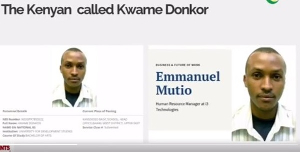The Ghana Chamber of Mines is advocating for the establishment of a Mineral Revenue Management Act to regulate how revenues generated from mining are allocated.
This proposed law would mirror the Petroleum Revenue Management Act, which oversees the distribution of oil sector revenues.
According to the Chamber, the law is essential for ensuring transparency in the utilisation of mineral revenues, helping Ghanaians understand how these funds are used for national development.
Although the mining sector has been a significant contributor to the country's Gross Domestic Product (GDP), export earnings, and government revenue, the absence of visible legacy projects and a clear legal framework has led to growing public concern.
The Ghana Revenue Authority (GRA) reports that direct taxes from the mining and quarrying sector grew significantly, rising from GH¢6.38 billion in 2022 to GHS11.55 billion in 2023—an 81.1 per cent increase.
This made the mining sector the largest source of direct domestic tax revenue, accounting for 22.7 per cent of the GRA’s total domestic tax receipts.
The sector’s corporate income tax (CIT) payments alone increased from GHS3.58 billion in 2022 to GHS7.47 billion in 2023, representing 25.5 per cent of aggregate CIT receipts for the year.
Mineral royalties also saw an increase, rising from GHS1.79 billion in 2022 to GHS2.77 billion in 2023, largely due to higher gold prices.
Payroll taxes (PAYE) from the mining sector similarly saw a rise of 30.4per cent, from GHS1.00 billion in 2022 to GHS1.31 billion in 2023.
Despite these gains, there are still concerns about how these revenues are utilised.
Speaking during a media interview after a field tour of mining companies in the Western Region, Ahmed Nantogmah, Director of External Relations and Communication at the Chamber of Mines, stressed the need for the Mineral Revenue Management Act.
"Enacting a legal regime for the management of mineral revenue would enhance transparency, allowing citizens to better understand and appreciate the sector’s contribution to national development," Mr. Nantogmah stated.
He also reiterated the Chamber’s call for the removal of VAT on exploration activities, noting that drilling and assaying, essential components of exploration, are costly due to the tax burden.
"Mining companies pay VAT when they do drilling and assaying, which is very expensive," he said, urging the government to reconsider the tax policy.
Mr. Nantogmah also raise concerns about the impact of illegal mining on legitimate companies and called for stronger government enforcement to address the issue. He highlighted the importance of ensuring adequate security for licensed mining companies, enabling them to operate without fear of illegal miners disrupting their work.
"Commercial mining companies are committed to responsible mining practices, including safeguarding the environment, creating jobs, paying taxes, and sourcing goods and services locally to support the country’s development," he emphasized.
Mr. Nantogmah also urged the media to play an active role in educating the public about the difference between responsible mining, which follows strict Environmental, Social, and Governance (ESG) standards, and illegal mining activities that harm the environment.
Watch the latest edition of BizHeadlines below:
Ghana’s leading digital news platform, GhanaWeb, in conjunction with the Korle-Bu Teaching Hospital, is embarking on an aggressive campaign which is geared towards ensuring that parliament passes comprehensive legislation to guide organ harvesting, organ donation, and organ transplantation in the country.
Click here to follow the GhanaWeb Business WhatsApp channel

















